We should all be grateful to Allesandra Stanley of the New York Times for having the wit to observe that there’s really nothing new, plot-wise, about the fantasy of divinities choosing to go slumming.
As she puts it, “Ancient mythology is full of stories of gods donning disguise to mingle with mortals and test their loyalty—or chastity.” She finds multiple examples of this same basic conceit in modern fiction, drama, and film, only here it is powerful human benefactors who take the Olympians’ role. And often there’s an underlying yearning for justice at play when “spoiled heiresses or tyrannical masters are forced into backbreaking labor and learn the error of their highhanded ways.”
What then of the minor gods known as CEOs in the CBS hit series, Undercover Boss? Stanley observes that this show addresses a “meeker yearning” on the part of today’s peasantry. America’s 21st-century proletarians, working for companies like Waste Management, 7-11, Hooters, and Flowers.com, are shown to be just plain grateful that the Big Guy in the corner office made the effort to notice them.
The way the show is set up, workers get to dream that their diligence will not be unnoticed or unrewarded. More importantly, the bosses get to see themselves in the role of benevolent masters, blessed with the human touch and all but bursting with fellow feeling. Stanley writes: “Each narrative is carefully crafted to depict the boss—and the corporation—as benevolent and worthy.” Companies now actually compete to have the show’s cameras record their crappy working conditions, because both they and the show’s viewers know that while actual justice won’t be rendered in the end, some small glimpse of human decency will shine through. Notes critic Stanley: “it’s the humility of the workers, their genuine astonishment and thankfulness over small acts of benevolence, that is most striking.”
And here I must observe, striking to her, perhaps, but not striking to people who have been paying attention to the degradation of work in Americans over the past 40 years. There is a long historical arc involved that goes something like this:
1. Colonialism brings to these shores the same habits of deference to one’s “betters” that prevailed in Olde England;
2. Revolution undertaken primarily by the gentry keeps these habits of deference going—for a time;
3. Shay’s Rebellion and other outbursts from below suggest some strong resistance to the old ways;
4. Radical republicanism becomes firmly rooted in working class communities, with nascent unionism as one of its most potent expressions; Jacksonian Democracy sweeps away the remnants of the old bowing and scraping among most free white males;
5. There ensues a long contest for workers’ loyalty, and a great many employers try to remain “union free” by adopting the role of benevolent dictators (Henry Ford, but also many others);
6. American working people achieve real emancipation through enactment of the 1935 Wagner Act, and the rate of unionization soars, remaining relatively high right through the 1960s;
7. Big business pushes back hard, flouting labor laws and hiring union-busting consultants to achieve “competitiveness” and “flexibility” during the 1970s and 1980s; business easily breaks the backs of the industrial unions by exercising the option to move production overseas;
8. With the labor movement now all but destroyed, we are back to servile acceptance of unfair, unjust practices on the part of many U.S. employers; workers suck it up, especially during hard times, and are generally thankful to have any job at all.
That’s the basic narrative, but a couple of sidebars also merit reflection.
First is the glorification of wealth in popular culture. It’s my sense that earlier generations (e.g., persons growing up during the Great Depression) acknowledged the reality of great wealth but were less inclined than people today to view the possession of wealth as particularly virtuous. One might say that popular culture today has raised the assigned social value of wealth—or has valorized it, to use the old Marxist term. Parallel to this valorization is the relatively new and completely unrealistic expectation on the part of people with bupkes that they might suddenly be the possessors of great wealth themselves: a kind of magical realism that state-run lotteries and gambling dens of all descriptions take full advantage of.
Second is the despicable way in which we have raised today’s young to buy into the casino mentality, where it’s each for himself or for herself and where learning the art of the con is every bit as important as any real achievement. We coach the best and brightest to slither their way up the greasy pole, while we counsel the dull to become plodding and deferential. We teach both groups to suck up to bosses, albeit in different ways.
Third (and obviously spilling into the others) is a troubling breakdown in basic moral education, and here I think our religious institutions must bear much of the blame. We have now gone through decades of seemingly endless nattering about the importance of self-esteem and assertiveness training, even as we have allowed ourselves to become total mice in relation to the petty tyrannies of the workplace. We’ve been teaching each other the wrong lessons: we teach people to steel themselves to triumph in an uneven and rigged playing field—and sometimes to challenge relatively small injustices—rather than to take aim at the monster injustices, like CEO/average worker compensation differentials of 300:1, or like the many unfair tax advantages enjoyed by the upper managerial ranks.
The religious failing here could not be more obvious: our spiritual guides and teachers have plainly not been teaching what it really means to be equal in God’s sight—equally invested with worth and dignity. They haven’t been helping rising generations to explore what deep-level self-respect means, which is a very different thing from the misplaced sense of entitlement that is all too common among the young.
To appreciate the spiritual achievement that is proper self-respect, we need only to recall the enormous spiritual achievement of the modern civil rights movement—the songs and sermons that forged a people’s fierce determination to stand tall and breathe the sweet air of freedom. For these nonviolent warriors everyday oppression was real and vicious. Perhaps for today’s abused American workers, there is a just-sufficient illusion of freedom to block any incipient struggle for self-respect from gathering force.
So yes, it appears that our workplaces will continue to be marked by servility and deference and self-effacement (and treachery and backbiting) for the foreseeable future. And then perhaps something will finally snap and people will get their small “d” democratic mojo back and realize that the Big Boss puts his pants on in the morning the same way they do. From which the conclusion may naturally and blessedly follow: Who the hell does he think he is?




